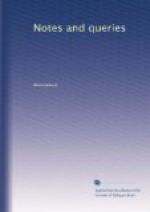W.S.G.
Newcastle, May 4. 1850.
* * * * *
Your correspondent “W.M.” ("Finkel.” p. 384.) may not have recollected that there is a beautiful ruin on the river Wear near Durham, of which the name is pronounced (though not spelt) Finkel Abbey.
* * * * *
Christian Captives (No. 27. p. 441.).—As a very small contribution towards an answer to “R.W.B.’s” inquiry, I may inform you that Lady Russell mentions in her Letters (p. 338., ed. 1792) that Sir William Coventry left by his will 3000l. to redeem slaves.
C.H.
* * * * *
Christian Captives (No. 27. p. 441.).—“R.W.B.” may be referred to the case of “Attorney-General v. the Ironmongers’ Company,” which was a suit for the administration of a fund bequeathed for the redemption of the captives. See 2 Mylne & Keen, 576.; 2 Beavan, 313., 10 Beavan, 194.; and 1 Craig & Philips, 208.: all of which I mention to be Reports in Chancery, in case he be not a lawyer.
A.J.H.
* * * * *
Ecclesiastical Year (No. 24. p. 381.).—“NATHAN” is informed, that, according to the legal supputation, until A.D. 1752, the year of Our Lord in that part of Great Britain called England, began on the 25th day of March, as he will find stated in the 24 Geo. II. c. 23., by which Act it was enacted, that the 1st day of January next following the last day of December, 1751, should be the first day of the year 1752; and that the 1st day of January in every year in time to come should be the first day of the year.
Philippe de Thaun, in his Livre des Creatures, which was written in the first half of the twelfth century, p. 48. of the edition published for the Historical Society of Science, has some remarks which may interest your correspondent, that are thus literally translated by Mr. Wright:—
“In March, the year ought always
to begin,
According to that explanation which we
find in the book,
That in the twelve kalends of April, as
your understand,
Our Creator formed the first,
Where the sun always will begin his course,
But at all times we make the year begin
in January,
Because the Romans did so first;
We will not un-make what the elders did.”
ARUN.
* * * * *
Hanap.—Among the specimens of ancient and mediaeval art now exhibiting in John Street, Adelphi, I was struck with the number of gilt cups, called in the catalogue hanaps. The word was new to me; but I have since met with it (as frequently happens after one’s interest has been excited with respect to a word) in Walter Scott’s Quentin Durward, in vol. i. chap. 3.; or rather, vol. xxxi. p. 60. of the edition in 48 vols., Cadell, 1831; in which place the context of the scene appears to connect the idea of hanap with a cup containing treasure.




